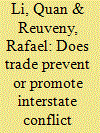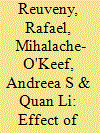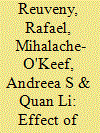|
|
|
Sort Order |
|
|
|
Items / Page
|
|
|
|
|
|
|
| Srl | Item |
| 1 |
ID:
020794


|
|
|
|
|
| Publication |
Dec 2001.
|
| Description |
719-742
|
|
|
|
|
|
|
|
|
|
|
|
|
|
|
|
| 2 |
ID:
109910


|
|
|
|
|
| Publication |
2011.
|
| Summary/Abstract |
Competing theories argue, respectively, that more trade reduces, increases, or does not affect interstate military conflict. We offer a new general theory on how trade affects conflict, which encompasses the liberal logic and the neo-Marxist/neo-mercantilist mechanism of asymmetric dependence and offers alternative explanations to the effects predicted by the bargaining and classical realist approaches. If a country expects its conflict toward a target to reduce the price of its import from or increase the price of its export to a target, it has an economic incentive to initiate conflict, and vice versa. These expectations can vary across trade flow directions and economic sectors. Using our model, we predict the effects of increases in exports and imports in five sectors on military conflict initiation. Statistical analysis of directed dyads from 1970 to 1997 largely supports our predictions. Rises in the initiator's imports of agriculture/fishery, energy, and chemical/mineral goods and exports of miscellaneous consumption goods reduce the likelihood of conflict initiation; rises in the initiator's exports of energy and both imports and exports of manufactured goods increase the likelihood. We evaluate implications for the literature and public policy.
|
|
|
|
|
|
|
|
|
|
|
|
|
|
|
|
| 3 |
ID:
107551


|
|
|
|
|
| Publication |
2011.
|
| Summary/Abstract |
We develop a model of repeated conflict that features probabilistic winner-take-all outcomes and compare its dynamics to the dynamics generated by a similar deterministic model in which combatants divide the conflict spoils. While these models generate the same behavior in a one-shot game, in a repeated setting the winner-take-all model generates richer dynamics than the dynamics generated by the deterministic model, which are new to the economics literature on conflict. As in real-world conflicts, the winner-take-all model generates changes in the relative dominance of combatants, full mobilization of fighting resources, and endogenous surrender. We evaluate the implications for the literature.
|
|
|
|
|
|
|
|
|
|
|
|
|
|
|
|
| 4 |
ID:
101693


|
|
|
|
|
| Publication |
2010.
|
| Summary/Abstract |
Does warfare affect the environment? This question has received some theoretical and empirical attention, but none of the extant studies has employed large-N statistical models. This article theorizes the possible effects of warfare on the environment and estimates large-N statistical models of these effects on CO2 emissions per capita, NOX emissions per capita, the rate of change in forested area, and a composite indicator of environmental stress reduction. The results indicate that warfare significantly affects the environment, but the signs and sizes of these effects depend on the environmental attribute (whether the fighting is at home or abroad) and development (whether the fighting country is developed or less developed). Warfare reduces CO2 emissions, but the effect is weaker in less developed countries (LDCs) than in developed countries (DCs). Warfare increases deforestation when fought at home and promotes forest growth when fought abroad, particularly in the LDCs. Warfare at home reduces NOX emissions for the LDCs and increases them for the DCs; warfare abroad increases NOX emissions for both the DCs and LDCs. Finally, warfare increases aggregated environmental stress, particularly for the LDCs when fought at home and for the DCs when fought abroad. The sizes of these effects are on par with or larger than the mandated or recommended policy goals stated by the US government for changes in CO 2 and NOX emissions, and by the World Bank (and by implication the DCs driving its policy) for the rate of deforestation, during the coming decade.
|
|
|
|
|
|
|
|
|
|
|
|
|
|
|
|
| 5 |
ID:
101692


|
|
|
|
|
| Summary/Abstract |
Does warfare affect the environment? This question has received some theoretical and empirical attention, but none of the extant studies has employed large-N statistical models. This article theorizes the possible effects of warfare on the environment and estimates large-N statistical models of these effects on CO2 emissions per capita, NOX emissions per capita, the rate of change in forested area, and a composite indicator of environmental stress reduction. The results indicate that warfare significantly affects the environment, but the signs and sizes of these effects depend on the environmental attribute (whether the fighting is at home or abroad) and development (whether the fighting country is developed or less developed). Warfare reduces CO2 emissions, but the effect is weaker in less developed countries (LDCs) than in developed countries (DCs). Warfare increases deforestation when fought at home and promotes forest growth when fought abroad, particularly in the LDCs. Warfare at home reduces NOX emissions for the LDCs and increases them for the DCs; warfare abroad increases NOX emissions for both the DCs and LDCs. Finally, warfare increases aggregated environmental stress, particularly for the LDCs when fought at home and for the DCs when fought abroad. The sizes of these effects are on par with or larger than the mandated or recommended policy goals stated by the US government for changes in CO 2 and NOX emissions, and by the World Bank (and by implication the DCs driving its policy) for the rate of deforestation, during the coming decade.
|
|
|
|
|
|
|
|
|
|
|
|
|
|
|
|
| 6 |
ID:
099041


|
|
|
|
|
| Publication |
London, Routledge, 2010.
|
| Description |
xii, 196p.
|
| Series |
Rethinking globalizations; 21
|
| Standard Number |
9780415776738
|
|
|
|
|
|
|
|
|
|
|
|
Copies: C:1/I:0,R:0,Q:0
Circulation
| Accession# | Call# | Current Location | Status | Policy | Location |
| 055287 | 337/THO 055287 | Main | On Shelf | General | |
|
|
|
|
| 7 |
ID:
023167


|
|
|
|
|
| Publication |
2002.
|
| Description |
383-401
|
|
|
|
|
|
|
|
|
|
|
|
|
|
|
|
| 8 |
ID:
083538


|
|
|
|
|
| Publication |
2008.
|
| Summary/Abstract |
The liberal formula for peace and prosperity in the 21st century involves substantial convergence in economic growth rates between the affluent North and the poor South, facilitating a decrease in the global North-South gap. This diminished developmental gap should lead to reduced conflict within the South and between the North and South. The problem is that long-term world economic growth is stimulated in part by intermittent upsurges in radical technology generated principally in the system's lead economy. These growth impulses diffuse outwards from the center of the North unevenly. We hypothesize that Northern economies are the primary beneficiaries of these periodic extensions of the technological frontier and that much less trickles down to the South. We test this question of uneven diffusion with time series data dating back to 1870 on systemic leadership growth, Northern economic growth, and Southern economic growth. We find that technological gains in the North have been more likely to expand the North-South gap than to close it. To the extent that the South and Southern turmoil are a function of uneven growth and stratification, neither is apt to disappear anytime soon.
|
|
|
|
|
|
|
|
|
|
|
|
|
|
|
|
| 9 |
ID:
022488


|
|
|
|
|
| Publication |
Aug 2002.
|
| Description |
484-514
|
|
|
|
|
|
|
|
|
|
|
|
|
|
|
|
| 10 |
ID:
050361


|
|
|
|
|
|
|
|